
Frédéric d' Erlanger Sheet Music
- Born: 29th May 1868
- Died: 23rd April 1943
- Birthplace: Paris, France
Baron Frédéric Alfred d'Erlanger was an Anglo-French composer, banker and patron of the arts. His father, Baron Frederic Emile d'Erlanger, was a German, while his mother, Mathilde (née Slidell), was an American. One of four sons, his father was the head of a French banking house. He began his musical studies in Paris under Anselm Ehmant, his only teacher. His first work, a book of songs, was published when d'Erlanger was 20 years of age. Shortly afterwards, in 1886, he moved to London with his elder brother, Emile d'Erlanger, to work as a banker, for the private banking firm that his father owned. Both d'Erlanger and his brother became naturalised Englishmen. His compositions include works of all kinds, notably the operas, 'Jehan de Saintré' (Aix-les-Bains, 1 Aug. 1893; Hamburg, 1894), 'Inès Menso' (produced, under the pseudonym of Ferd. Regnal, in London at Covent Garden on 10 July 1897, and subsequently in Germany); 'Tess' (after Thomas Hardy's 'Tess of the d'Urbervilles), produced at the San Carlo Theatre, Naples, on 10 April 1906 and at Covent Garden on 14 July 1909; and 'Noël', produced at the Paris Opéra-Comique on 28 December 1910. Among d'Erlanger's other works are a string Quartet, a Sonata for violin and pianoforte, an 'Andante symphonique' for cello and orchestra, a Quintet for pianoforte and strings, a 'Suite symphonique' for orchestra (1895), a violin Concerto, Op. 17 played by Kreisler at the Philharmonic Concert of 12 March 1903, and a 'Concerto symphonique' for piano and orchestra (1921). One of his later works was a Requiem for solo voices, chorus and orchestra in 1931. Clearness of form and elegance of idea and expression are the distinguishing marks of d'Erlanger's music, whether in his operatic work, in his chamber and orchestral music, or in his songs